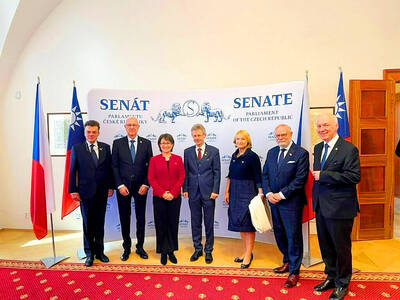UN arms experts swooped in on a newly declared site near Baghdad yesterday, saying it was among locations disclosed by Iraq in its mammoth weapons declaration.
Inspections resumed across Iraq a day after the US threatened possible nuclear retaliation if its forces or allies were attacked with doomsday weapons.
Teams of inspectors, escorted by Iraqi officials, drove from their Baghdad headquarters to five sites as their hunt for Iraq's alleged banned arsenal picked up pace in its third week.
One team arrived at the Kara-mah complex in Taji, 10km north of Baghdad.
"The site we are going to this morning is one of the new sites that was given in the declaration and we need your help to get us there at this point," William Jolley, head of one UN inspection team, told an accompanying Iraqi official.
Jolley was speaking within earshot of reporters outside a walled compound called the "Strategic Storage Unit," according to a sign at the entrance, operated by Karamah Public Company.
The inspectors parked one of their white vehicles across the main gate to block access while they were inside. Taji houses complexes suspected of past involvement in Iraq's biological warfare and ballistic missile programs.
UN experts checked four other locations: Ibn Sina nuclear site in Tarmiya 30km northwest of Baghdad, Tuweitha nuclear site20km south of Baghdad, a biological site at Amriyah 45km to the southwest, and Fateh chemical site on the city's outskirts.
Inspectors who had spent the night at a phosphate facility at al-Qaem, 400km northwest of Baghdad -- said to have produced refined uranium ore -- resumed work yesterday.
Al-Qaem is the furthest the inspectors have travelled from Baghdad.
The US raised the temperature in its confrontation with Iraq over weapons of mass destruction, saying in a strategy document that it could even go nuclear if such weapons were used against its forces or its allies.
"The United States will continue to make clear that it reserves the right to respond with overwhelming force -- including through resort to all our options -- to the use of WMD [weapons of mass destruction] against the United States, our forces abroad, and friends and allies," the document said.
US officials said the passage on nuclear deterrence was not a change in policy but had been added to the document, the first update since 1993, to put more emphasis on the role of deterrence against a weapons of mass destruction attack.
Iraq accused the US of looking for an excuse for war by seizing control from the UN of distribution of the 12,000-page declaration of Baghdad's weapons programs.
The White House said the accusation was "laughable," but Security Council members such as Norway and Syria -- who will be given only an edited copy of the document -- said they were being treated as second-class powers.
At the UN, chief weapons inspector Hans Blix said he hoped to have an assessment of the Iraqi arms declaration next week after distributing an edited version of the document to the full 15-member Security Council.

Two US House of Representatives committees yesterday condemned China’s attempt to orchestrate a crash involving Vice President Hsiao Bi-khim’s (蕭美琴) car when she visited the Czech Republic last year as vice president-elect. Czech local media in March last year reported that a Chinese diplomat had run a red light while following Hsiao’s car from the airport, and Czech intelligence last week told local media that Chinese diplomats and agents had also planned to stage a demonstrative car collision. Hsiao on Saturday shared a Reuters news report on the incident through her account on social media platform X and wrote: “I

SHIFT PRIORITIES: The US should first help Taiwan respond to actions China is already taking, instead of focusing too heavily on deterring a large-scale invasion, an expert said US Air Force leaders on Thursday voiced concerns about the Chinese People’s Liberation Army’s (PLA) missile capabilities and its development of a “kill web,” and said that the US Department of Defense’s budget request for next year prioritizes bolstering defenses in the Indo-Pacific region due to the increasing threat posed by China. US experts said that a full-scale Chinese invasion of Taiwan is risky and unlikely, with Beijing more likely to pursue coercive tactics such as political warfare or blockades to achieve its goals. Senior air force and US Space Force leaders, including US Secretary of the Air Force Troy Meink and

‘BUILDING PARTNERSHIPS’: The US military’s aim is to continue to make any potential Chinese invasion more difficult than it already is, US General Ronald Clark said The likelihood of China invading Taiwan without contest is “very, very small” because the Taiwan Strait is under constant surveillance by multiple countries, a US general has said. General Ronald Clark, commanding officer of US Army Pacific (USARPAC), the US Army’s largest service component command, made the remarks during a dialogue hosted on Friday by Washington-based think tank the Center for Strategic and International Studies. Asked by the event host what the Chinese military has learned from its US counterpart over the years, Clark said that the first lesson is that the skill and will of US service members are “unmatched.” The second

Czech officials have confirmed that Chinese agents surveilled Vice President Hsiao Bi-khim (蕭美琴) during her visit to Prague in March 2024 and planned a collision with her car as part of an “unprecedented” provocation by Beijing in Europe. Czech Military Intelligence learned that their Chinese counterparts attempted to create conditions to carry out a demonstrative incident involving Hsiao, which “did not go beyond the preparation stage,” agency director Petr Bartovsky told Czech Radio in a report yesterday. In addition, a Chinese diplomat ran a red light to maintain surveillance of the Taiwanese